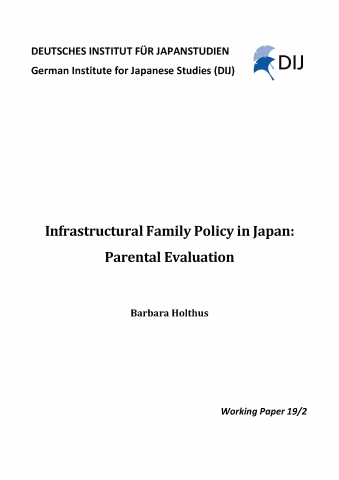
Download
Infrastructural Family Policy in Japan: Parental Evaluation
Details
2019, Deutsches Institut für JapanstudienAuthors
Infrastructural Family Policy in Japan: Parental Evaluation

The continuing low fertility rate in Japan, coupled with high ageing is a severe problem for Japan’s social welfare system and its economy. One important element of family policies is to provide affordable and good quality childcare institutions. In international scholarship on the evaluation of family policies, surveying parents specifically in regard to their satisfaction with family policies is rare. For the case of Germany, studies find daycare expansion positively associated particularly with maternal subjective well-being, with some differences between parents in West and East Germany, as well as that parents’ education, their income, and the age of the child all impact their levels of satisfaction with family policies. Mirroring the study by Camehl et al. (2015) and applying this to the case of Japan, I conducted a quantitative analysis of the JPWS 2012 (Japan Parental Well-Being Survey) data. Findings are that Japanese mothers’ and fathers’ own experiences are an important indicator for their satisfaction with family policies. If they managed to secure a childcare space, in particular in a public daycare center, they are more likely to be satisfied with family policies. A place in a public daycare center in contrast to any other childcare institution contributes most significantly to the parents’ satisfaction with family policies. Furthermore, the region of living is a highly significant factor. Parents in the urban metropolitan areas of Kanto and Kinki are significantly less satisfied—due in part to the fact that in these urban areas daycare spaces are more difficult to get than in anywhere else. In regards to infrastructural family policy satisfaction, gender differences in satisfaction pale in comparison to regional differences. it is hoped that policy makers will acknowledge the importance of evaluating the “success” of family policies by the level of satisfaction of parents with family policies, and that the diverse conditions and needs of families in different regions be adequately addressed.
Keywords: Family policy, satisfaction, regional differences, gender, daycare, childcare institutions